Musical Notes
Create successful practice, explore a composer's historical lifestyle, learn about modern composers, experience local performances - Musical Notes will enhance your music education and capture your imagination. Be Inspired!
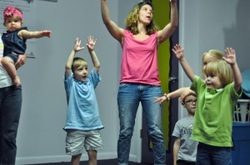 Originally posted on Kindermusik's Blog. Pairing language with movement sets the stage for cognitive and kinesthetic learning. The right hemisphere of the brain is our emotional side where much of our creativity is channeled. The left hemisphere organizes logical skills, such as language. When children are engaged in movements determined by the lyrics, the brain automatically cross-references both hemispheres, mapping creativity and logic (Fishbourne, G. 1998) Tips for parents: Family involvement in education can be as simple as turning on a favorite recording with lyrics or singing a favorite tune. Listen for a bit and then discuss the different ways you could move based on the words of the song. As you dance together with your child, you can also label some of those movements, further strengthening the impact of the “moving to learn” experience. Plus, parent involvement in early childhood education through singing and dancing strengthens your role as your child’s first and best teacher.
0 Comments
If you live in Greenville, SC and enjoy old movies, make your plans to head to Falls Park on Wednesday evenings to watch classics like Rudy, Superman, or The Shop Around the Corner. Every Wednesday night in September, Fidelity Investments sponsors Moonlight Movies. Showing begin around 8:00pm - about sundown, and you're welcome to bring blankets, lawn chairs, and a cooler packed with snacks. For more information, visit the city of Greenville's website by clicking here.
Looking for a quality piano for a beginner or intermediate student. The Yamaha P22 is specifically geared for schools and rehearsal halls. This specific piano was manufactured in Thomaston, GA in 1990 and has been kept in near-new condition. The retail price is around $2,500. You can email the owner by clicking here.
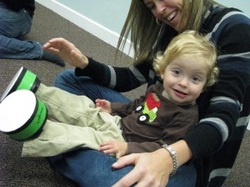 Originally Posted by Theresa Case on Kindermusik's Blog Early childhood education is important, and Kindermusik International believes that you – the parent – are your child’s first and best teacher. But what to do with your child until he is 7 years old? We’d like to recommend Kindermusik! 9 Ways Music Classes Prepare Your Child for School Music classes in the early years that include parental involvement and focus on learning in a fun, developmentally appropriate way inspire a lifelong love for learning. Practice with steady beat, enjoying movement activities, and playing instruments help develop coordination and motor skills necessary for cutting with scissors, holding a pencil, or kicking a ball, for example. Music classes that are teaching children rhymes and then later, the basics of beginning to read music pave the way to literacy. Music classes give your child a place to practice those all-important social skills, like cooperatively play, sharing, and following directions. The best music classes will encourage your child to think creatively, developing critical thinking skills and the ability to problem-solve. In an environment where process, not performance, is stressed, music classes build self-confidence and a willingness to try new things. Music classes that gradually increase a child’s independence at the class help the child more successfully transition to the school classroom. In these classes, children have the opportunity to bond and interact with their teacher, learning to listen and respond to someone other than the special adults who surround them at home. Science and research have proven time and time again that music positively impacts a child in all areas of development – social/emotional, language, cognitive, physical, and language/literacy. From music skills to life skills, it’s all there in Kindermusik, where music and learning play! Visit JessicasPianoStudio and try a free Kindermusik class on us today. 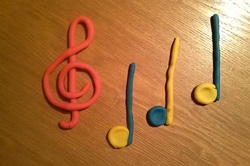 My boys and I love to play with playdough - The only problem we run into is that I like to keep the colors separate and they like to mix them together. Oh well!!! In early childhood education and elementary school - including piano lessons - playdough provides some wonderful benefits for youngsters: creative thinking, eye-hand coordination, fine motor skills, etc. You probably watch each week as I point out a wide variety of musical symbols to your child! We talk about how "a quarter note gets ONE count," "a rest means that we have to be quiet," "the treble clef means we use our right hand to play," etc, etc, etc! Occasionally we use crayons to color these symbols, or we search for them on a page filled with musical notation. Playdough is just one more way to review these important theory symbols with your budding musician - whether they like to mix colors or not! Have them fashion a green bass clef followed by pink quarter notes, and complete the rhythm pattern by adding bar lines - don't forget the double bar line at the end. They can even make those quarter notes go up and down on the table as they sing the melody of a song! A little person's creativity is boundless - and they aren't bothered with how things are "supposed to be done." They're learning and discovering new things everyday! So, pull out that playdough and spend some time creating music with your child. You'll probably be amazed at how many musical symbols they remember from their lessons!  Originally Posted on Kindermusik's Blog, Aug 12, 2013 One of the fabulous benefits of your enrollment in Kindermusik is Kindermusik@Home – a whole new way to access and enjoy your Home Materials throughout the week. But how can Kindermusik@Home make parenting a little bit easier? Well, you might turn to Kindermusik@Home when you…
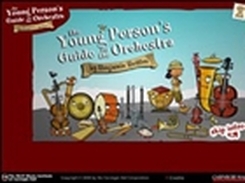 The Instruments have gone missing - and it's your job to find them! Join Violet on an instrument safari, guided by her venerable uncle Ollie, and help her collect all the instruments of the orchestra. You'll hear strains of Benjamin Britten's The Young Person's Guide to the Orchestra, and the full version once the instruments are all found! Click here to play. (Ages 7 and up) 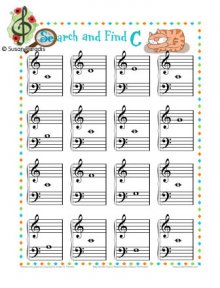 It's been so much fun to watch my Little Mozarts - my 4-year-old and 5-year-old students - learn all the notes on the keyboard. Now, we're moving on to finding notes on the treble and bass clefs. As I was looking for extra activities to help reinforce this new way of reading notes, I found these Search and Find worksheets created by Susan Paradis. I can't wait to try them out this week! If you're little musician is getting bored of simply playing these new notes and doing flashcards (two great ways to learn notes, but the repetition can get a little tedious), these worksheets would be a great option to use. I will probably laminate my copies so I can use them over and over again! And parents, if you choose to print a worksheet for your child, you can definitely count it toward their practice time! 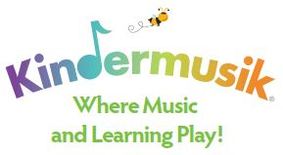 Originally posted on Kindermusik's Blog, Minds on Music: July 31, 2013 With so many choices out there for young children, we thought we’d try to help make the decision a little easier by sharing our top 10 benefits of enrolling in Kindermusik. Benefit #1: Kindermusik gives your child that unique head start you’ve been looking for – musically, cognitively, and academically. Benefit#2: Kindermusik inspires a love of music from an early age with songs, instruments, and activities that are just right for each age and every stage. Benefit #3: Kindermusik enhances every area of your child’s development – we are so much more than just music! Benefit #4: Kindermusik gives you the time and the tools to enjoy quality time with your child – in class and at home. Benefit #5: Kindermusik Home Materials let you take the music, fun, and learning with you all week long, wherever you go. Benefit #6: Kindermusik classes provide a happy social outlet for your child and a valuable support network for you. Benefit #7: All Kindermusik activities are research-proven and giggle-approved, and all are supported by a developmental and musical focus. Benefit #8: Kindermusik lays a strong foundation for future success in school and in formal music lessons later on. Benefit #9: Kindermusik is something you and your child will use every day – at home or on the go! Benefit #10: Kindermusik offers a comprehensive program with the potential for positively impacting your child from newborn all the way to 7 years of age. From Music Skills to Life Skills, it's all there in Kindermusik! Best of all, your child will love it and so will you. Check out one of our age-appropriate classes today! One of my student's parents introduced me to The GiggleBellies, and I can't wait to get some of these familiar songs for my boys. My boys absolutely love the colorful characters and the entertaining songs! This YouTube video features one of our favorite songs, we love to do the Finger Play while we sing: Music provides so many benefits for youngsters. The calming lullabies on these digital downloads or DVDs may calm your child and lull them into sleep, while the upbeat songs will provide a great opportunity for dancing, singing and using their boundless amounts of energy - all in the safety of your playroom! Music has also been found to increase children's brain development in many areas, including Cognitive Development, Emotional/Social Interaction, Physical Development, and Language Acquisition.
|
Jessica's Piano Studio
Jessica B.
Teacher at Jessica's Piano Studio to many talented students! Here's some helpful tips and interesting information to create a wonderfully educational musical experience! Archives
March 2015
Categories
All
|